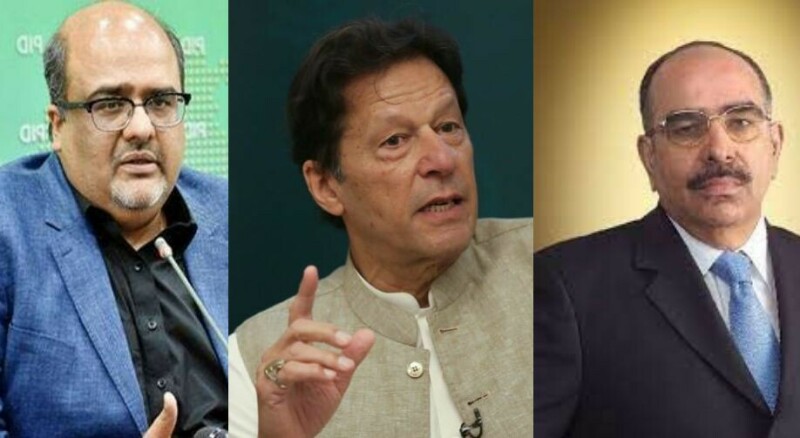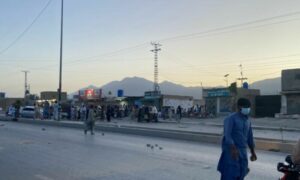Case alleges Imran Khan and his wife, Bushra Bibi, accepted Rs5 billion for whitewashing Rs50 billion that was returned by the UK during the PTI govt’s tenure.
Originally published on May 9, 2023; updated on January 13, 2025.
An accountability court on Monday yet again postponed its long-awaited verdict in the £190 million Al-Qadir Trust corruption reference against ex-premier Imran Khan and his spouse Bushra Bibi. It is now expected to be announced on January 17.
The case alleges that Imran and his wife obtained billions of rupees and land worth hundreds of kanals from a real estate firm for legalising Rs50 billion that was identified and returned to the country by the UK during the previous PTI government.
The PTI chief was first arrested in relation to the case on May 9, 2023 — a development that triggered nationwide protests and riots. He was later released after the Supreme Court declared the arrest unlawful. In Nov 2023, Imran, who was already imprisoned at the Adiala Jail in the cipher case, was again arrested by the National Accountability Bureau in the Al-Qadir Trust case. He has remained in prison since then.
Last year in February, an accountability court indicted Imran and his wife in the case, shortly after the general elections. After several hearings into the case, all of which were conducted at the Adiala Jail, the court reserved its verdict on Dec 18, saying the verdict would be announced on Dec 23.
However, the verdict was delayed until Jan 6 due to winter vacations. Then, on Jan 6, the decision could not be pronounced as Judge Nasir Javed Rana was on leave.
Today, the verdict was again delayed for the third time. Previously, in a statement on PTI’s X account, Imran was quoted as calling the Al-Qadir Trust case “bogus” and without merit.
But what is the Al Qadir Trust case and why has the former premier been implicated in it?
The reference
The reference filed by NAB alleged that Imran, who is currently in jail, played a “pivotal role in the illicit transfer of funds meant for the state of Pakistan into an account designated for the payment of land by Bahria Town, Karachi”.
It also claimed that despite being given multiple opportunities to justify and provide information, the accused deliberately, with mala fide intention, refused to give information on one pretext or another.
Property tycoon Malik Riaz Hussain and his son Ahmed Ali Riaz, Mirza Shehzad Akbar, and Zulfi Bukhari are also among the suspects in this reference, but instead of joining the investigation and subsequent court proceedings, they absconded and were subsequently declared proclaimed offenders (PO).
Farhat Shahzadi, a close friend of Imran’s spouse, and Ziaul Mustafa Nasim, a legal expert for the PTI government’s Assets Recovery Unit, were also declared POs. Subsequently, the properties of all six accused had been frozen.
While testifying before the accountability court on December 10 last year, Imran termed the corruption charges against him “politically motivated” orchestrated by his opponents allegedly with the support of state institutions.
“My political rivals have weaponised institutions to crush dissent and curb democracy,” he had said.
The reference said the “accused […] were given multiple opportunities to justify and provide information, but they deliberately, with mala fide intention, refused to provide the information on one or the other pretext.
“Furthermore, it is established through their responses that they have nothing in their defence to rebut the above-mentioned allegations. Thus, they all have committed an offence” under the National Accountability Ordinance (NAO).
It added that the investigation proceedings and findings so far “established that accused persons in connivance with each other have committed the offence of corruption and corrupt practices” as defined under the NAO.
Akbar, a former special assistant to the premier and Asset Recovery Unit chief, played a “crucial role” in the “illegal design of the funds” which were meant for the state, the reference said.
Malik, the reference said, had “actively aided, abetted and assisted and acted in conspiracy” with the other respondents for the diversion of funds earmarked for the state.
Bushra Bibi and Shahzadi also played a “significant” and “crucial” role in the “illegal activities”, the latter also a “frontwoman” for Imran and his wife, it said.
The reference said that it was “just and proper” to proceed against the eight suspects as there was “sufficient incriminating evidence” available to justify the reference. It pleaded that the eight suspects be tried and punished under the law by the court or any other to which the reference was entrusted.
How did it all begin?
It all started five years ago when The National Crime Agency (NCA) of the United Kingdom agreed to a settlement worth £190 million with the family of property tycoon Malik Riaz.
According to the statement released by the NCA, the settlement included a UK property — 1 Hyde Park Place, London, W2 2LH — valued at approximately £50 million and all of the funds landed in the frozen accounts of Malik Riaz.
The first record of the NCA’s move to probe the property and assets belonging to Riaz in the UK surfaced in December 2018, shortly after the Pakistan Tehreek-i-Insaf (PTI) came to power. The crime agency in a press release dated Aug 14, 2019, stated: “The NCA has been granted freezing orders on eight bank accounts containing a total of more than £100 million, which is suspected to have derived from bribery and corruption in an overseas nation. Approximately £20m held by a linked individual was frozen following a hearing in December 2018.”
Earlier that year, the Supreme Court of Pakistan had accepted Riaz’s offer of Rs460bn as settlement dues by his real estate firm, Bahria Town Ltd, after it was found to have illegally acquired thousands of acres of land on Karachi’s outskirts in district Malir.
Hours after the NCA verdict, Malik Riaz had tweeted that the recovered amount would go to the Supreme Court against the fine worth Rs460bn.
Read: Malik Riaz and the art of the deal
Subsequently, the money was transferred to the Supreme Court’s accounts, instead of the Government of Pakistan’s account. When the NCA had announced its decision, Special Assistant to the Prime Minister (SAPM) on Accountability Mirza Shahzad Akbar had claimed that the money would directly come to the state.
On being questioned over this ambiguity later, SAPM Akbar had replied: “Is the Supreme Court not part of the government? So if the money goes to the apex court, it means that the money comes to the state.”
The SAPM had also refused to entertain questions regarding the origin of the money and how it had come to be stashed away abroad, citing confidentiality clauses between the parties involved in the case, including the UK. “We have inked a bond of confidentiality with the UK government and therefore we cannot talk about the details of the case,” he told a presser.
The case against Imran
In June 2022, the matter resurfaced after an alleged audio leak, purportedly of a telephone conversation between Malik Riaz and his daughter, wherein the two could be heard talking about the supposed demands of Farah Khan aka Gogi — a friend of Imran Khan’s wife Bushra Bibi — against some alleged favours from the previous government of Imran Khan. The woman, believed to be Riaz’s daughter, told her father that Farah had told her that the (former) first lady had asked her not to accept a three-karat diamond ring and demanded a five-karat one.
Subsequently, Riaz had denied his role in any political matters, and in a tweet claimed that the leaked audio clip attributed to him and his daughter was “fabricated”.
A week later, then-interior minister Rana Sanaullah had accused Imran and his wife of accepting Rs5bn and hundreds of kanals of land for protecting the real estate firm in a money laundering case.
Addressing a press conference in Islamabad, Sanaullah said Bahria Town had “illegally transferred” Rs50bn to a Pakistani national in the UK. The transfer, he said, was identified by the UK’s National Crime Agency, which subsequently informed the then PTI government of the crime.
Sanaullah claimed that Imran, the prime minister at the time, had tasked Shehzad Akbar, ex-PM’s aide on accountability, to resolve the matter. Akbar “settled” the entire case, while the Rs50bn — which was state property and belonged to the national treasury — was adjusted against Bahria Town’s liability, the interior minister had alleged.
The next day, the federal cabinet constituted a committee to probe into
Imran and his wife Bushra’s alleged involvement in the case.
According to Sanaullah, Bahria Town had donated hundreds of acres of land to Al-Qadir Trust, with the agreement bearing signatures of the real estate developer’s donors and Bushra Khan — the wife of former premier Imran.
He said the non-profit organisation had only two trustees: Imran Khan and Bushra Bibi. The minister added that another 240 kanals were transferred to “Farah Shehzadi”.
NAB steps in
In an apparent attempt to tighten the noose around real estate tycoon Malik Riaz and close aides to PTI Chairman Imran Khan, the National Accountability Bureau (NAB) asked Riaz and other beneficiaries to appear before it on Dec 1, 2022.
“Call-up notice to the persons acquainted with facts of the case under section 19 of the National Accountability Ordinance-1999, inquiry against holders of public office and others qua misuse of authority, financial gains and criminal breach of trust in recovery of crime proceeds received from the UK and illegal sealing of its record,” the NAB notice had said.
It said the inquiry into allegations of misuse of authority, financial gains and criminal breach of trust had revealed that Ali Riaz Malik and others entered into an out-of-court settlement agreement with Britain’s National Crime Agency for repatriation of funds to the government of Pakistan.
“Moreover, M/s Bahria Town donated land measuring 458 acres, four marlas and 58 square feet, situated at Mauza Barkala, Tehsil Sohawa, District Jhelum, for Al Qadir Trust University. Therefore, you are in possession of information /evidence whatsoever, which relates to the commission of the said offence(s),” the notice added. According to unconfirmed reports, Imran Khan’s wife is one of the trustees of the trust.
The NAB had earlier sent notices to 21 members of former premier Imran Khan’s cabinet. Prominent among them were: Ghulam Sarwar Khan, Murad Saeed, Pervez Khattak, Shafqat Mahmood, Shireen Mazari, Ali Haider Zaidi, Hammad Azhar and Zulfi Bukhari.
Bukhari was initially summoned by the NAB on Nov 29, but only appeared before the accountability watchdog after missing several hearings.
On May 9, 2023, as Imran appeared before the IHC in an unrelated case, he was apprehended by Rangers personnel. Hours after the arrest, Interior Minister Rana Sanaullah said in a press conference Imran was arrested by officials of the National Accountability Bureau (NAB) specifically in the Al-Qadir Trust case, adding that there were “dozens” of other cases with corruption inquiries in progress against the former premier.
The interior minister said that the NAB had issued notices to the PTI chief regarding the corruption cases against him and asked him to present himself and become a part of the investigation. He added that there was no need for extensive investigations if Imran had become involved since there was documentary proof and evidence present in the cases.
“It was necessary for him to present himself and give answers but he did not do so. He challenged those notices in the high court and ultimately the high court said that the [legal] process in accordance with law cannot be stopped and he should become a part of the investigation and submit his response but despite that, he did not feel it appropriate to become a part of the investigation. Because of this NAB had to implement his arrest.”











